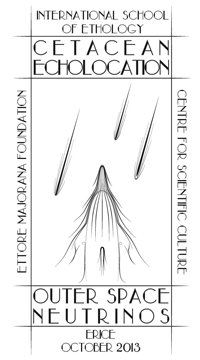The development of underwater ocean observatories has stimulated new interactions between disparate disciplines to optimize the their sensors and layout. Observatories based upon underwater cables are expensive to install and difficult to move, but they offer particular promise for long term observational data sets unlike any gathered to date. The cost and opportunity argue for planning and technical exchanges from as broad an array of disciplines as possible. One of the least predictable synergies has come from interactions between astrophysicists working to detect light and acoustic signals from neutrinos and marine biologists listening to the sounds of marine animals (Nosengo, Nature 462, December 2009). Marine bioacoustics, acoustical oceanography and astroparticle physics have now many aspects in common; while they are distinctly different disciplines that have not interacted in the past, they have begun to converge in the project NEMO (Neutrino Mediterranean Observatory) managed by INFN-LNS (Istituto Nazionale di Fisica Nucleare – Laboratori Nazionali del Sud) with important national and international partners. This cooperation among different disciplines is further developed within SMO (Submarine Multidisciplinary Observatory), an INFN project funded by the Italian Government, and extends in the EU-ESFRI project KM3NeT aiming at the construction of a km3-scale deep-sea laboratory incorporating a neutrino telescope. Acoustics is a particularly good medium for remote sensing in the ocean because sound propagates more efficiently than other cues. Long range propagation means that sounds from many sources are often detected by ocean acoustic sensors. Rather than having each discipline search for their signal of interest among what is treated as random noise, it may be more effective for all of the disciplines to work together to tease apart their signals of interest from ocean acoustic sensors, helping one another to separate each desired signal from undesired ones. This will require each discipline to acquire a deeper understanding of the other relevant disciplines than is common in today’s partitioned world of science. This workshop is intended to join these different disciplines to promote the understanding of the underwater acoustic world and the development of common research strategies and tools. The workshop will focus on the study of the acoustic behaviour of marine mammals, on the acoustic detection of neutrinos in the sea, on the sources of sound in the ocean, on the sharing of detection technologies, and on the related technological challenges with a broad interdisciplinary approach. On goal of the workshop will be to explore technologies that can improve acoustic detection capabilities, to serve both biological and physical studies. Another goal is to explain the basic scientific issues driving both communities. We will explain the source of acoustic signatures of neutrinos from space, and will explore the sensory and cognitive skills that have allowed mammals to successfully exploit the marine environment and to evolve as top predators there by using acoustics. The workshop is ideally related to an early workshop “UNDERWATER BIOACOUSTICS: Behavioural, Environmental & Evolutionary Perspectives” organized by the International School of Ethology in 1994. To balance the very different themes of the workshop, the following main sessions are planned: Acoustic communication, vocal learning and cognition in marine mammals Astrophysics with acoustics in deep sea Submarine Multidisciplinary Observatories Information technology infrastructures for acoustic data acquisition, archival and analysis Interdisciplinary approach to Computational (Bio)Acoustics Advanced marine research for conservation Principles of acoustical oceanography The expected audience would come from different disciplines, mainly marine biology, marine bioacoustics, ethology, acoustics, mathematics, acoustical oceanography, astroparticle physics and embraces many science fields related with the study, monitoring and conservation of the marine environment. Top scientists will present the state of the art in their peculiar disciplines and selected contributes will be presented by participants in a context open to discussion and knowledge sharing in the warm and friendly environment of the Ettore Majorana Centre.
Invited speakers
Peter Tyack (UK)
Douglas Gillespie (UK)
Lee Thompson (UK)
San Danaher (UK)
Paul White (UK)
Paolo Favali (I)
Walter Zimmer (I)
Francesco Simeone (I)
Herve Glotin (F)
Bob Gisiner (US)
Henrik Schmidt (US)
S. Kim Juniper (Canada)
Tiago Marques (P)
Michel André (SP)
Sander Benda-Beckmann (NL)
Hong Young Yan (Taiwan)
Lars Kindermann (D)
others to be confirmed soon

